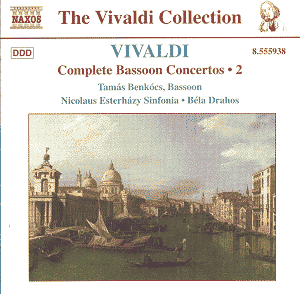Antonio Vivaldi’s thirty-nine+ concertos for the bassoon were
written for pupils – all girls – at the Venetian orphanage where
he worked for many years as director of music. Clearly, these
girls - or might it have been one exceptional girl –
who knows? - were no slouches, for the concertos present all
kinds of serious technical challenges. They call for effortlessly
smooth finger-work, rapid tonguing, easy familiarity with all
registers of the instrument, and above all, an ability to project
an expressively intense melodic line. And all of this on the
18th century bassoon, which had precious little key-work
to assist the player.
To regard these pieces as mere ‘teaching material’ would be
completely wrong and unfair. Yes, their quality is uneven;
but the best of them contain delightful music, full of Vivaldi’s
natural gifts of melodic and harmonic invention. Although the
strings and continuo undoubtedly act as a discreet backdrop
for the soloist for much of the time, their parts are always
enjoyable to play, and full of beguiling little details.
As I listened to this CD, I warmed more and more to the work
of the performers. Though the Hungarian soloist, Tamás Benkócs, plays on a modern instrument,
he is a superb stylist, and manages to characterise the music
strongly without ever seeming to distort it. Meanwhile, Béla
Drahos and the Nicolaus Esterházy Sinfonia give sympathetic,
unobtrusive support, while playing with the necessary gusto
when necessary. Balance between soloist and tutti is always
exemplary.
My personal favourite of this selection?
It has to be the unusual B flat Concerto subtitled La Notte
(‘The Night’), with its programmatic character bringing
it close to the ‘Seasons’ in nature. But they’re all lovely;
give it a try – at Ł4.99. you cannot go wrong, and, who knows,
this could change your entire perception of one of the most
beautiful, but also one of the most misunderstood, of musical
instruments.
Gwyn
Parry-Jones

![]() Tamás Benkócs (bassoon), Nicolaus Esterházy Sinfonia/Béla Drahos
Tamás Benkócs (bassoon), Nicolaus Esterházy Sinfonia/Béla Drahos![]() NAXOS 8.555938 [55:11]
NAXOS 8.555938 [55:11]












